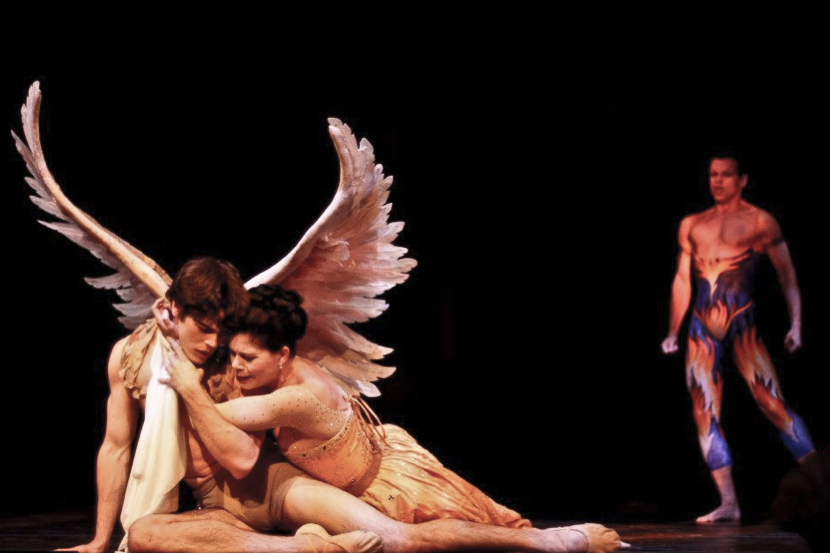 April 14, 2012. Elgin Theatre, Toronto.
April 14, 2012. Elgin Theatre, Toronto.
Armide is a Muslim princess who loves to hate her enemy—the crusader warrior Arnaud: she falls in love with Arnaud and ends by hating that she loves him.
Jean-Baptiste Lully’s 17th century study of contradictory emotions is as up-to-date as these lines from a 1950’s pop hit: “Sometimes I love you, sometimes I hate you …But when I hate you it’s ’cause I love you.”
The libretto rolls towards an overwhelming question: which is stronger, Love or Hate? Lully’s final answer is —Love, because it’s grip is the more painful.
Given the unhappy nature of the theme, Team Opera Ateliers’s Armide is a feast of candy for the ear and for the eye. Gerard Gauci’s set is kind of psychedelic Big Rock Candy Mountain delicious. Dora Rust D’Eye’s costumes for the principals are colourful opulence variegated to the edge of fantastic. The youthful Artists of the Ballet, both the angels and the demons, exhibit in-your-dreams bodies costumed in what at first appears to be just ink, or in this Middle Eastern tradition, just henna. None more striking than the boss-demon, Hate incarnate, played by triple threat baritone-actor-dancer Curtis Sullivan.
Tafelmusik, aptly styled by Atelier co-director Marshall Pynkoski as the ‘best and bravest baroque orchestra in the world,’ complete with Chorus, under the baton of David Fallis, exhales a silvery stream of plangent tones that conjures the court of France’s Sun King for the audience to relax into and take its pleasure at a leisurely pace. Much of Lully’s music is continuo for recitatif, in which the music charms the mind that is engaged in following a narrative argument. The succeeding orchestral airs are noticeably varied in tempo, often toe-tappingly dancelike. Recitative and melodic airs (both supported by elegant metric and rhyming structures) stimulate while also lulling one into an appreciative trance.
One cannot cavil with the Cast. Like the dancers, they are all beautiful, well costumed and impeccably staged, supporting faultless song with stylish gesture at every point. Peggy Kriha Dye brings vocal richness to the title role. As a character conflicted between the urge to dominate and the urge to surrender to love she is never actually satisfied, and that consistent dissatisfaction can be a bit wearing. Colin Ainsworth as her foil, Renaud, manages to be gallant, loving, light, and surprisingly easily led, as if his lack of centre were a strength.
Peerless bass/baritone Olivier LaQuerre and tenor Aaron Ferguson save Renaud from the toils of Armide’s enchantment, and also rescue the opera from a near fatal seriousness. One highlight is their mock horror at the appearance of monsters from hell whom they indicate by gesticulating into the musician’s pit.
Armide’s ladies-in-waiting, always buoyant on the stage in the forms of Carla Huhtanen, that most versatile of sopranos, and the stately Meghan Lindsay, balance the paired companion knights of Renaud, and provide convincing counterbalances to Armide’s conflicted argument with herself. They come off as real girlfriends to Armide, no small feat in the formal, artificial atmosphere of this entertainment.
Bonnie Beecher’s lighting is steady and when need be, as in the Hadean scenes, spectacular, which could also describe the over-all pacing of this long, lofty opera. Lully is not as dramatic a writer as Verdi, nor as heart-rending as Puccini. If I had to seek a comparison for the effect of Armide, I would go to the Japanese Bugaku/Gagaku performances which are designed to provide spectacle appropriate to an environment in which members of a caste privileged to near divine status can just hang out.
Nice work, if you can get it, and you can get it HERE from Sunday, April 15, 2012, 3:00 P.M through Saturday, April 21, 2012, 7:30 P.M.
Please leave your comments HERE.
